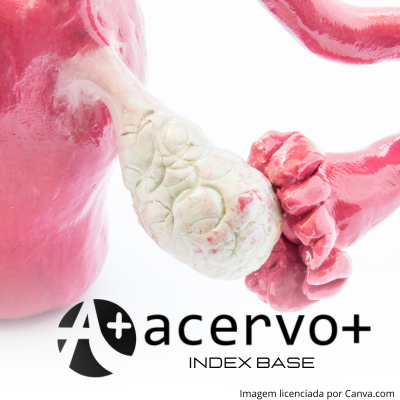Relação entre o desenvolvimento da resistência à insulina e a Síndrome do Ovário Policístico e seu manejo terapêutico
##plugins.themes.bootstrap3.article.main##
Resumo
Objetivo: Analisar a relação da Síndrome do Ovário Policístico (SOP) com o desenvolvimento da resistência à insulina (RI), incluindo os tipos de tratamento envolvidos. Métodos: Consiste em uma revisão integrativa de literatura, realizada em setembro de 2024, nas bases de dados National Library of Medicine and National Institutes of Health (PubMed) e Biblioteca Virtual de Saúde (BVS). Os descritores utilizados, a partir dos Descritores em Ciências da Saúde (DeCS), foram “polycystic ovary syndrome” e “insulin resistance”, em conjunto com o operador booleano AND. Foram excluídas revisões sistemáticas, meta-análises e revisões de literatura e incluídos estudos de livre acesso, publicados entre 2019 e 2024. Resultados: Este artigo foi realizado a partir da análise de 15 estudos que abordam a relação da SOP com a resistência à insulina, contendo as intervenções necessárias para essas doenças. Os resultados encontrados foram apresentados nos Quadros 1 e 2, que incluem os autores e os principais achados. Considerações finais: Diante da análise do estudo, conclui-se que mulheres com SOP têm uma tendência maior a desenvolver RI e existem tratamentos que atenuam esses resultados.
##plugins.themes.bootstrap3.article.details##
Copyright © | Todos os direitos reservados.
A revista detém os direitos autorais exclusivos de publicação deste artigo nos termos da lei 9610/98.
Reprodução parcial
É livre o uso de partes do texto, figuras e questionário do artigo, sendo obrigatória a citação dos autores e revista.
Reprodução total
É expressamente proibida, devendo ser autorizada pela revista.
Referências
2. FATIMA Q, et al. Evaluation of antioxidant defense markers in relation to hormonal and insulin parameters in women with polycystic ovary syndrome (PCOS): A case-control study. Diabetes & Metabolic Syndrome: Clinical Research & Reviews, 2019; 13: 1957-1961.
3. FREEMAN AM, et al. Insulin Resistance. Nih.gov, 2023.
4. HESHMATI J, et al. Effects of curcumin supplementation on blood glucose, insulin resistance and androgens in patients with polycystic ovary syndrome: A randomized double-blind placebo-controlled clinical trial. Phytomedicine, 2021; 80: 153395.
5. JABARPOUR M, et al. Astaxanthin supplementation impact on insulin resistance, lipid profile, blood pressure, and oxidative stress in polycystic ovary syndrome patients: A triple-blind randomized clinical trial. Phytotherapy research: PTR, 2024; 38: 321-330.
6. LEJMAN-LARYSZ K, et al. Influence of vitamin D on the incidence of metabolic syndrome and hormonal balance in patients with polycystic ovary syndrome. Nutrients, 2023; 15: 2952.
7. LI X, et al. The risk factors of gestational diabetes mellitus in patients with polycystic ovary syndrome. Medicine, 2021; 100: 26521.
8. LIVADAS S, et al. Insulin resistance, androgens, and lipids are gradually improved in an age-dependent manner in lean women with polycystic ovary syndrome: insights from a large Caucasian cohort. Hormones, 2020; 19: 531-539.
9. MA R, et al. Short-term combined treatment with exenatide and metformin for overweight/ obese women with polycystic ovary syndrome. Chinese Medical Journal, 2021; 134: 2882-2889.
10. MAFFAZIOLI GDN, et al. Prevalence of metabolic disturbances among women with polycystic ovary syndrome in different regions of Brazil. International Journal of Gynecology & Obstetrics, 2020; 151: 383-391.
11. MORGANTE G, et al. Metformin doses and body mass index: clinical outcomes in insulin resistant polycystic ovary syndrome women. European review for medical and pharmacological sciences, 2020; 24: 8136-8142.
12. RONDANELLI M, et al. Berberine phospholipid is an effective insulin sensitizer and improves metabolic and hormonal disorders in women with polycystic ovary syndrome: A one-group pretest-post-test explanatory study. Nutrients, 2021; 13: 3665.
13. RYU K, et al. Risk of type 2 diabetes is increased in nonobese women with polycystic ovary syndrome: the National Health Insurance Service-National Sample Cohort Study. Fertility and Sterility, 2021; 115: 1569-1575.
14. SHAHMORADI S, et al. The effect of magnesium supplementation on insulin resistance and metabolic profiles in women with polycystic ovary syndrome: a randomized clinical trial. Biological Trace Element Research, 2023; 202: 941-946.
15. WEN Q, et al. Effect of acupuncture and metformin on insulin sensitivity in women with polycystic ovary syndrome and insulin resistance: a three-armed randomized controlled trial. Human Reproduction, 2021; 37: 542-552.
16. WHO. WORLD HEALTH ORGANIZATION. 2023. In: Polycystic ovary syndrome. Disponível em: https ://www.who.int/news-room/fact-sheets/detail/polycystic-ovary-syndrome. Acesso em: 6 nov. 2024.

